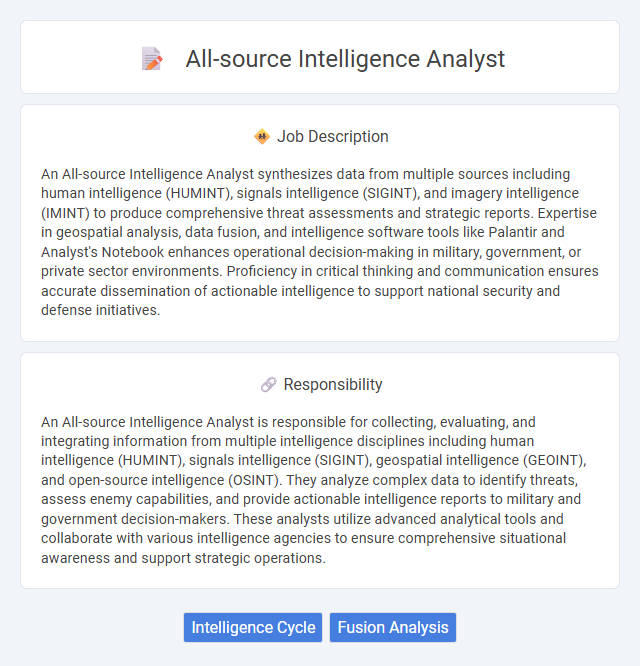
An All-source Intelligence Analyst synthesizes data from multiple sources including human intelligence (HUMINT), signals intelligence (SIGINT), and imagery intelligence (IMINT) to produce comprehensive threat assessments and strategic reports. Expertise in geospatial analysis, data fusion, and intelligence software tools like Palantir and Analyst's Notebook enhances operational decision-making in military, government, or private sector environments. Proficiency in critical thinking and communication ensures accurate dissemination of actionable intelligence to support national security and defense initiatives.
Individuals with strong analytical skills and the ability to process information from diverse sources are likely suitable for an All-source Intelligence Analyst role. Those who can handle high-pressure environments and demonstrate attention to detail may thrive, whereas people prone to stress or difficulty focusing might find the job challenging. Emotional resilience and adaptability probably increase the chances of success in this demanding position.
Qualification
An All-source Intelligence Analyst requires a strong background in data analysis, critical thinking, and proficiency in intelligence collection techniques from multiple sources including SIGINT, HUMINT, and open-source intelligence. Key qualifications include a bachelor's degree in criminal justice, international relations, or a related field, along with experience in classified environments and knowledge of intelligence software platforms such as Analyst's Notebook and Palantir. Security clearance, excellent communication skills, and the ability to synthesize complex data into actionable intelligence reports are essential for success in this role.
Responsibility
An All-source Intelligence Analyst is responsible for collecting, evaluating, and integrating information from multiple intelligence disciplines including human intelligence (HUMINT), signals intelligence (SIGINT), geospatial intelligence (GEOINT), and open-source intelligence (OSINT). They analyze complex data to identify threats, assess enemy capabilities, and provide actionable intelligence reports to military and government decision-makers. These analysts utilize advanced analytical tools and collaborate with various intelligence agencies to ensure comprehensive situational awareness and support strategic operations.
Benefit
Benefits of working as an all-source intelligence analyst likely include gaining access to a wide range of classified information, which enhances analytical skills and broadens understanding of global security issues. This role probably offers strong career advancement opportunities due to its demand in military and government sectors. The position may also provide stability, competitive salaries, and benefits such as healthcare and retirement plans.
Challenge
An All-source Intelligence Analyst probably faces complex challenges in synthesizing data from multiple intelligence disciplines to generate actionable insights. They likely encounter obstacles related to the accuracy and reliability of diverse information sources, requiring constant evaluation and critical thinking. The role probably demands adaptability in rapidly changing environments to anticipate and mitigate potential threats effectively.
Career Advancement
An All-source Intelligence Analyst leverages diverse data streams, including human intelligence, signals intelligence, and open-source intelligence, to provide comprehensive threat assessments and strategic insights. Career advancement typically involves specialization in cyber intelligence, counterterrorism, or regional expertise, coupled with further security clearances and advanced certifications like Certified Intelligence Analyst (CIA). Progression can lead to senior analyst roles, intelligence team leadership, or positions within federal agencies such as the CIA, FBI, or Department of Defense, where strategic decision-making and policy development responsibilities expand.
Key Terms
Intelligence Cycle
An All-Source Intelligence Analyst collects, evaluates, and synthesizes data from multiple intelligence disciplines to support decision-making processes. Expertise in the Intelligence Cycle phases--planning, collection, processing, analysis, dissemination, and feedback--ensures comprehensive threat assessments and timely intelligence products. Mastery of tools such as link analysis, geospatial intelligence, and open-source exploitation enhances accurate situational awareness and operational effectiveness.
Fusion Analysis
All-source Intelligence Analysts specialize in fusion analysis by integrating data from multiple intelligence disciplines such as HUMINT, SIGINT, IMINT, and OSINT to produce comprehensive and actionable intelligence reports. They employ advanced data correlation techniques and geospatial analysis tools to identify patterns, threats, and emerging trends in complex operational environments. Their expertise supports decision-making processes in military, law enforcement, and national security agencies by providing timely, accurate, and multi-dimensional threat assessments.
 kuljobs.com
kuljobs.com